National Film Awards Celebrate Indian Cinema; Mithun Chakraborty Receives Dadasaheb Phalke Honor
Cinema has always played a crucial role in shaping society, reflecting its values, and inspiring change. Over time, films and filmmaking have become more advanced. This remarkable journey of Indian cinema began in 1913 when the father of Indian cinema, Dadasaheb Phalke, created the first indigenous film, Raja Harishchandra. His passion and unwavering dedication to filmmaking paved the way for future generations, inspiring countless storytellers to push boundaries and elevate Indian cinema. To honor this legacy and encourage the creation of high-quality storytelling, the Ministry of Information and Broadcasting confers the prestigious National Film Awards along with cinema’s highest honor, the Dadasaheb Phalke Award each year. The 70th National Film Awards were conferred on 8 October 2024 by Hon. President Draupadi Murmu.
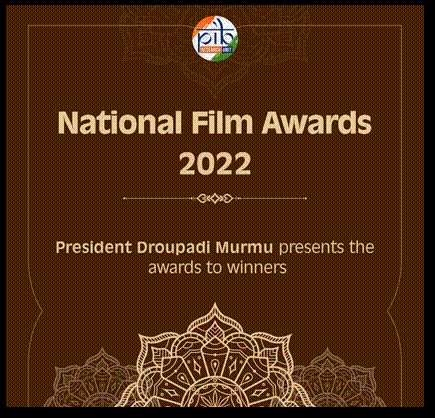
Objectives
The Awards aim at encouraging the production of films of aesthetic & technical excellence and social relevance contributing to the understanding and appreciation of cultures of different regions of the country in cinematic form, thereby also promoting unity and integrity of the nation. The awards also aim at encouraging the study and appreciation of cinema as an art form and dissemination of information and critical appreciation of this art form through publication of books, articles, reviews etc.
History
The National Film Awards (NFA) were established in 1954 to promote cinematic excellence in India.
-
-
- In the first edition of the National Film Awards, the awards were given for the films of the year 1953. The awards were initially called ‘State Awards’ and two President’s Gold Medals, two certificates of merit, and 12 silver medals for regional films were presented in the earlier years.[1]
- The 1st National Film Awards (State Awards) were held over two days, during which exhibitions were held and two documentaries were premiered, along with the presentation of awards. The State Awards were initially instituted to encourage the production of films of a high aesthetic and technical standard with educational and cultural value. The Film Enquiry Committee (established in 1949), which recommended the institution of the State Awards, also suggested that Regional Awards for feature films should be given in the following years. The Regional Best Award was given to the National Best Film for the first six years. The number of awards has increased over the years. The first Best Actor and Best Actress awards were given to Uttam Kumar and Nargis, respectively, in 1968. This was after the awards for artists and technicians were separately established for the films of 1967. The Best Actress award was initially called ‘Urvashi’ and the Best Actor award was called ‘Bharat’. To commemorate the release of the first Indian Feature Film, Raja Harishchandra on 3rd May 1913, it was decided to confer the National Film Awards on 3rd May of every year.
- Over the years, the awards have seen different award categories and nomenclatures. Several technical crafts have also been added to the award categories. Gradually, the number of awards has been increasing.
- Every year, after seeking entries for the NFA for the previous year, the Ministry constitutes juries for Feature Film, Non Feature Film and Best Writing in Cinema sections separately, comprising of people distinguished in the field of cinema, allied forms of art and humanities. Since the 57th National Film Awards, the awards in the feature film section are decided through a two-tier selection process. The entries are shortlisted by five regional panels and then winners of the awards are decided by a national panel. The Non-Feature Film section and the Best Writing on Cinema has juries specific to the award. The selection for the Dadasaheb Phalke award is based on their commendations of a committee of eminent film personalities, specially constituted for the purpose. No entries are invited for this award.
- The organization of film festivals was the mandate of the Directorate of Films Festivals, which was transferred to National Film Development Corporation (NFDC) in March 2022.
70th National Film Awards (2022) Ceremony
The winners of the 70th National Film Awards for the year 2022 were announced by the jury on 16th August 2024. The 70th National Film Awards ceremony was held on October 8, 2024, at Vigyan Bhawan, New Delhi, where President Droupadi Murmu presented the awards.
Key Sections of the Awards
- Feature Film Awards: Recognizing outstanding feature films across various languages and genres.
- Non-Feature Film Awards: Celebrating excellence in short films, documentaries, and animation.
- Best Writing on Cinema: Honouring books and critics that explore and contribute to the discourse on Indian cinema.
- Dadasaheb Phalke Award: Awarded for lifetime contributions to Indian cinema.
Winners Of National Film Awards 2022
Best Writing on Cinema Results
- The Award for Best Book on Cinema has been given to “Kishore Kumar: The Ultimate Biography,” written by Anirudha Bhattacharjee and Parthiv Dhar in English. The book was published by HarperCollins Publishers India Pvt. Ltd. Both authors received the Swarna Kamal and a cash prize of Rs. 1,00,000 each.
- The Award for Best Film Critic has been conferred upon Deepak Dua for his work in Hindi language. He received the prestigious Swarna Kamal and a cash prize of Rs. 1,00,000.

Non-Feature Films Results
- The Award for Best Non-Feature Film has been conferred on Ayena (Mirror) in Hindi/Urdu, produced by The Films and directed by Siddhant Sarin. The winner received the Swarna Kamal and a cash prize of Rs. 3,00,000 each.
- The Award for Best Debut Film of a Director has been given to Madhyantara (Intermission) in Kannada, directed by Basti Dinesh Shenoy. The winner is honored with the Swarna Kamal and a cash prize of Rs. 3,00,000.
- The Award for Best Biographical / Historical Reconstruction / Compilation Film has been awarded to Aanakhi Ek Mohenjo Daro (Yet Another Mohenjo Daro) in Marathi, produced by de Goan Studio & Ashok Rane Productions and directed by Ashok Rane. The award includes Rajat Kamal and a cash prize of Rs. 2,00,000 each.
- The Award for Best Arts / Culture Film has been jointly awarded to:
(a) Ranga Vibhoga (Temple Dance Tradition) in Kannada, produced and directed by Suneel Narasimhachar Puranik.
(b) Varsa (Legacy) in Marathi, produced and directed by Sachin Balasaheb Suryawanshi. The award includes the Rajat Kamal and a cash prize of Rs. 2,00,000.
5. The Award for Best Documentary has been given to Murmurs of the Jungle in Marathi, produced and directed by Sohil Vaidya. The award includes the Rajat Kamal and a cash prize of Rs. 2,00,000 .
6. The Award for Best Non-Feature Film Promoting Social and Environmental Values has been conferred upon On the Brink Season 2 – Gharial in English, produced by The Gaia People and directed by Akanksha Sood Singh. The award includes the Rajat Kamal and a cash prize of Rs. 2,00,000.
7. The Award for Best Animation Film has been given to A Coconut Tree (Silent), produced by JB Productions and directed and animated by Joshy Benedict. The award includes the Rajat Kamal and a cash prize of Rs. 2,00,000.
8. The Award for Best Short Film (Up to 30 Minutes) has been awarded to Xunyota (Void) in Assamese, produced by HM Production and directed by Nabapan Deka. The award includes the Rajat Kamal and a cash prize of Rs. 2,00,000.
9. The Award for Best Direction has been conferred upon From the Shadows in Bengali/Hindi/English, directed by Miriam Chandy Menacherry. The award includes the Swarna Kamal and a cash prize of Rs. 3,00,000.
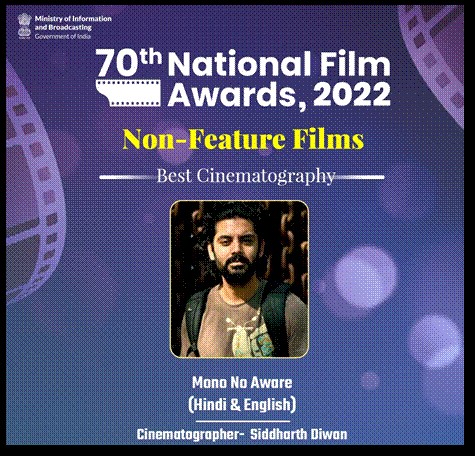
- The Award for Best Cinematography has been awarded to Mono No Aware in Hindi and English, with cinematography by Siddharth Diwan. The award includes the Rajat Kamal and a cash prize of Rs. 2,00,000.
- The Award for Best Sound Design has been given to Yaan (Vehicle) in Hindi/Malwi, with sound design by Manas Choudhury. The award includes the Rajat Kamal and a cash prize of Rs. 2,00,000.
- The Award for Best Editing has been conferred upon Madhyantara (Intermission) in Kannada, with editing by Suresh URS. The award includes the Rajat Kamal and a cash prize of Rs. 2,00,000.
- The Award for Best Music Direction has been given to Fursat (Leisure) in Hindi, with music direction by Vishal Bhardwaj. The award includes the Rajat Kamal and a cash prize of Rs. 2,00,000.
- The Award for Best Narration/Voice Over has been awarded to Murmurs of the Jungle in Marathi, with narration by Sumant Shinde. The award includes the Rajat Kamal and a cash prize of Rs. 2,00,000.
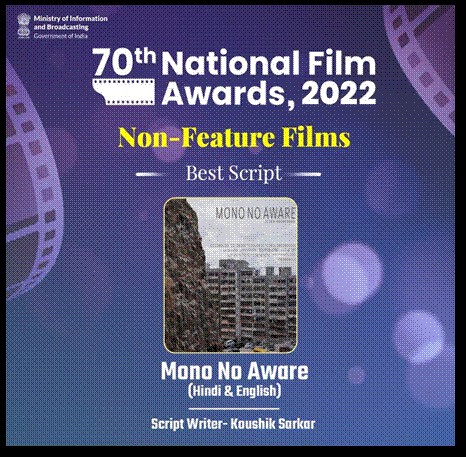
- The Award for Best Script has been given to Mono No Aware in Hindi and English, written by Koushik Sarkar. The award includes the Rajat Kamal and a cash prize of Rs. 2,00,000.
- A Special Mention has been given to:
- Birubala “Witch to Padmashri” in Assamese, produced by Aimee Baruah Production Society and directed by Aimee Baruah. The recognition includes a certificate.
- Hargila – The Greater Adjutant Stork in Assamese, produced by PI Entertainment and directed by Partha Sarathi Mahanta. The recognition includes a certificate.
Feature Films – Results
- The Award for Best Feature Film has been conferred upon Aattam (The Play) in Malayalam, produced by Joy Movie Productions LLP and directed by Anand Ekarshi. The award includes the Swarna Kamal and a cash prize of Rs. 3,00,000 .
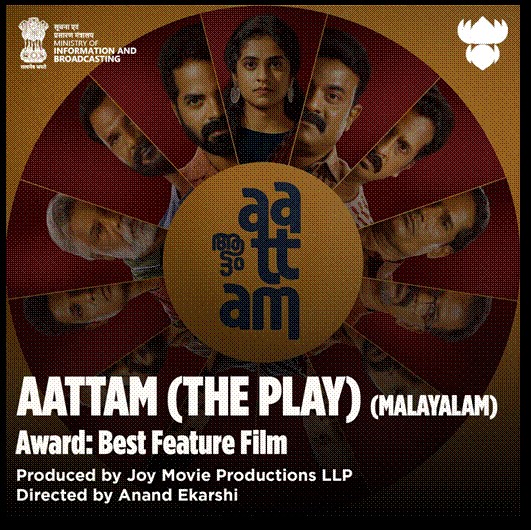
- The Award for Best Debut Film of a Director has been given to Fouja in Haryanvi, directed by Pramod Kumar. The award includes the Swarna Kamal and a cash prize of Rs. 3,00,000.
- The Award for Best Popular Film Providing Wholesome Entertainment has been awarded to Kantara in Kannada, produced by Hombale Films LLP and directed by Rishab Shetty. The award includes the Swarna Kamal and a cash prize of Rs. 3,00,000.
- The Award for Best Feature Film Promoting National, Social, and Environmental Values has been given to Kutch Express in Gujarati, produced by Soul Sutra LLP and directed by Viral Shah. The award includes the Rajat Kamal and a cash prize of Rs. 2,00,000.
- The Award for Best Film in AVGC (Animation, Visual Effects, Gaming & Comic) has been given to Brahmastra – Part 1: Shiva in Hindi, produced by Dharma Productions, Prime Focus, and Starlight Pictures, and directed by Ayan Mukerji. The award includes the Swarna Kamal and a cash prize of Rs. 3,00,000. VFX supervisors Jaykar Arudra, Viral Thakkar, and Neelesh Gore share the Rajat Kamal and a cash prize of Rs. 2,00,000.
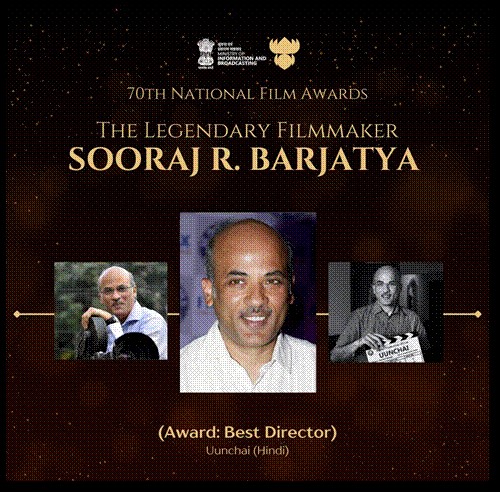
- The Award for Best Direction has been awarded to Uunchai (Zenith) in Hindi, directed by Sooraj R. Barjatya. The award includes the Swarna Kamal and a cash prize of Rs. 3,00,000.
- The Award for Best Actor in a Leading Role has been conferred upon Rishab Shetty for his performance in Kantara (Kannada). The award includes the Rajat Kamal and a cash prize of Rs. 2,00,000.
- The Award for Best Actress in a Leading Role has been shared between Nithya Menen for her performance in Thiruchitrambalam (Tamil) and Manasi Parekh for her performance in Kutch Express (Gujarati). The award includes the Rajat Kamal and a cash prize of Rs. 2,00,000.
- The Award for Best Actor in a Supporting Role has been given to Pavan Raj Mallhotra for his performance in Fouja (Haryanvi). The award includes the Rajat Kamal and a cash prize of Rs. 2,00,000.
- The Award for Best Actress in a Supporting Role has been awarded to Neena Gupta for her performance in Uunchai (Zenith) (Hindi). The award includes the Rajat Kamal and a cash prize of Rs. 2,00,000.
- The Award for Best Child Artist has been given to Sreepath for his performance in Malikappuram (Malayalam). The award includes the Rajat Kamal and a cash prize of Rs. 2,00,000.
- The Award for Best Male Playback Singer has been awarded to Arijit Singh for the song “Kesariya” in Brahmastra – Part 1: Shiva (Hindi). The award includes the Rajat Kamal and a cash prize of Rs. 2,00,000.
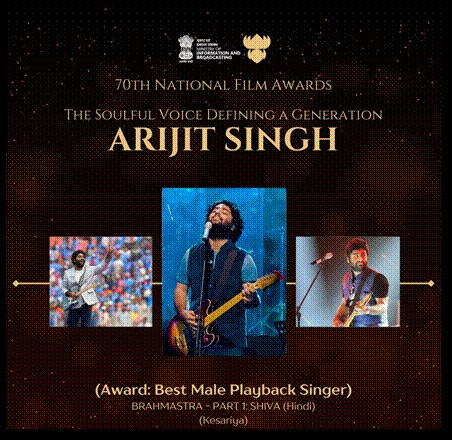
- The Award for Best Female Playback Singer has been given to Bombay Jayashri for the song “Chaayum Veyil” in Saudi Vellakka CC.225/2009 (Malayalam). The award includes the Rajat Kamal and a cash prize of Rs. 2,00,000.
- The Award for Best Cinematography has been awarded to Ravi Varman for his work in Ponniyin Selvan – Part I (Tamil). He received the Rajat Kamal and a cash prize of Rs. 2,00,000.
- The Award for Best Screenplay has been awarded to:
- Anand Ekarshi for Aattam (The Play) (Malayalam) in the original category. He received the Rajat Kamal and a cash prize of Rs. 2,00,000.
- Arpita Mukherjee & Rahul V Chittella for Gulmohar (Hindi) in the dialogue writing category. The award includes Rajat Kamal and a cash prize of Rs. 2,00,000.
- The Award for Best Sound Design has been given to Anand Krishnamoorthi for his work in
Ponniyin Selvan – Part I (Tamil). He received the Rajat Kamal and a cash prize of Rs. 2,00,000.
- The Award for Best Editing has been awarded to Mahesh Bhuvanend for Aattam (The Play) (Malayalam). The award includes the Rajat Kamal and a cash prize of Rs. 2,00,000.
- The Award for Best Production Design has been given to Ananda Addhya for his work in Aparajito (The Undefeated) (Bengali). The award includes the Rajat Kamal and a cash prize of Rs. 2,00,000.
- The Award for Best Costume Design has been awarded to Niki Joshi for her work in Kutch Express (Gujarati). The award includes the Rajat Kamal and a cash prize of Rs. 2,00,000.
- The Award for Best Make-up has been given to Somnath Kundu for his work in Aparajito (The Undefeated) (Bengali). The award includes the Rajat Kamal and a cash prize of Rs. 2,00,000.
- At the National Film Awards, the Best Music Direction (Songs) award was presented to Pritam for his work on Brahmastra – Part 1: Shiva (Hindi). He received the Rajat Kamal and a cash prize of ₹2,00,000. In the same category, A.R. Rahman won the Best Music Director Award for Background Music for the Tamil film Ponniyin Selvan – Part I. He was honored with the Rajat Kamal and a cash prize of ₹2,00,000.
- Naushad Sadar Khan won the Best Lyricist award for his song Salaami, which played a pivotal role in the Haryanvi film Fouja. He was honored with the Rajat Kamal and a cash prize of ₹2,00,000.
- Jani Master and Sathish Krishnan were awarded Best Choreographer for the Tamil film Thiruchitrambalam for their work on the song Megham Karukatha. They received the Rajat Kamal and a cash prize of ₹2,00,000.
- Anbariv won the Best Action Direction Award (Stunt Choreography) for the Kannada film K.G.F Chapter-2. He was awarded the Rajat Kamal and a cash prize of ₹2,00,000.
- Best Feature Film in each of the language:
This award is specified to all the films made in the language specified in the Schedule VIII of the Constitution.
- Emuthi Puthi (A Very Fishy Trip) won Best Assamese Film. The producer, Metanormal Motion Pictures Pvt Ltd, and director Kulanandini Mahanta were awarded the Rajat Kamal and a cash prize of ₹2,00,000 each.
- Kaberi Antardhan (Kaberi Vanishes) was honored as the Best Bengali Film. The producer, Surinder Films Pvt. Ltd., and director Kaushik Ganguly received the Rajat Kamal and ₹2,00,000 each.
- Gulmohar won Best Hindi Film. The producer, Star India Pvt. Ltd., and director Rahul V. Chittella were awarded the Rajat Kamal and ₹2,00,000 each.
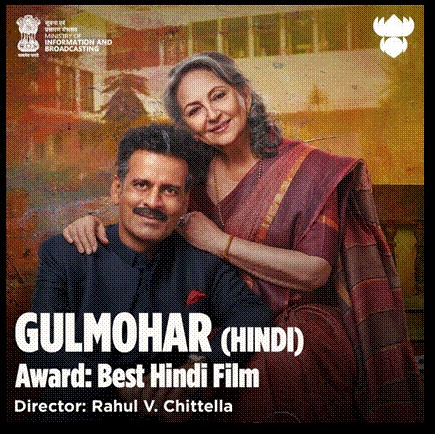
- K.G.F Chapter-2 received the award for Best Kannada Film. The producer, Hombale Films LLP, and director Prashanth Neel were presented with the Rajat Kamal and ₹2,00,000 each.
- Saudi Vellakka CC.225/2009 (Saudi Baby Coconut CC.225/2009) won Best Malayalam Film. The producer, Urvasi Theatres, and director Tharun Moorthy were honored with the Rajat Kamal and ₹2,00,000 each.
- Vaalvi (The Termite) won Best Marathi Film. The producers, Mayasabha Karamanuk Mandali and Zee Entertainment Enterprises Ltd., along with director Paresh Mokashi, were awarded the Rajat Kamal and ₹2,00,000 each.
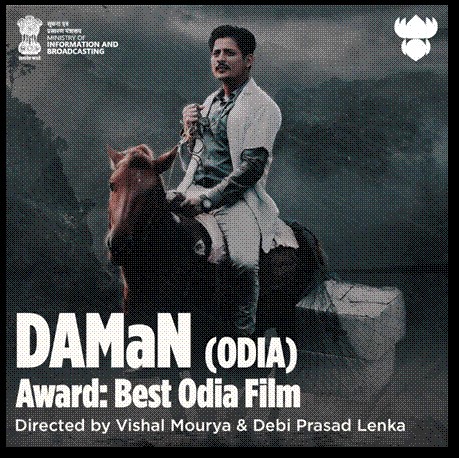
- Daman won Best Odia Film. The producers, JP Motion Pictures, and directors Vishal Mourya & Debi Prasad Lenka were awarded the Rajat Kamal and ₹2,00,000 each.
- Baghi Di Dhee (The Daughter of a Rebel) won Best Punjabi Film. The producer, G-Next Media Pvt. Ltd., and director Mukesh Gautam were presented with the Rajat Kamal and ₹2,00,000 each.
- Ponniyin Selvan-Part I received the award for Best Tamil Film. The producer, Madras Talkies, and director Mani Ratnam were awarded the Rajat Kamal and ₹2,00,000 each.
- Karthikeya-2 (Daivam Manushya Rupena) won Best Telugu Film. The producers, Abhishek Agarwal Arts LLP and People Media Factory, along with director Chandoo Mondeti, were awarded the Rajat Kamal and ₹2,00,000 each.
26. Award for Best Feature Film in each of the languages other than those specified in Schedule VIII of the Constitution:
Sikaisal (If Only Trees Could Talk) was awarded the Best Tiwa Film at the National Film Awards. The film’s producer, Imaging Media, and Dr. Bobby Sarma Baruah were honored with the prestigious Rajat Kamal and a cash prize of ₹2,00,000 each.
27. At the 70th National Film Awards, Manoj Bajpayee was honored with a Special Mention for his outstanding performance in the Hindi film Gulmohar. Additionally, music director Sanjoy Salil Chowdhury received a Special Mention for his exceptional contribution to the Malayalam film Kadhikan.
Dadasaheb Phalke Lifetime Achievement Award
Instituted in 1969 when presented to Devika Rani, the Dadasaheb Phalke Award was introduced by the Government of India to commemorate Dadasaheb Phalke’s contribution to Indian cinema. Honoured with the highest award in the field of cinema, the recipients are recognized for their ‘outstanding contribution to the growth and development of Indian cinema’. The Dadasaheb Phalke Award, India’s highest honor in cinema, is presented annually by the President of India to individuals who have made outstanding contributions to the growth and development of Indian cinema. The award consists of a Swarna Kamal, a cash prize of ₹15 lakh, and a shawl.
The following members were part of the Dadasaheb Phalke Award Selection Committee:
- Ms. Asha Parekh
- Ms. Khushbu Sundar
- Mr. Vipul Amrutlal Shah
Dadasaheb Phalke Lifetime Achievement Award 2022.
Legendary actor Mr. Mithun Chakraborty was honoured with the Dadasaheb Phalke Lifetime Achievement Award for the year 2022. Mithun Chakraborty, also known as Mithun Da, is an iconic Indian actor, producer, and politician, recognized for his versatile roles and distinctive dancing style. Born Gourang Chakraborty on June 16, 1950, in Kolkata, West Bengal, he earned the National Film Award for Best Actor in his very first film, “Mrigayaa” (1976). Mithun gained significant popularity in the 1980s with his role in “Disco Dancer” (1982), a film that became a major success both in India and internationally, establishing him as a dancing sensation.
Later, he won two more National Film Awards for his roles in Tahader Katha (1992) and Swami Vivekananda (1998). Over his extensive career, Mithun has acted in more than 350 films across various Indian languages, including Hindi, Bengali, Odia, Bhojpuri, and Telugu. He is known for his diverse performances, ranging from action to drama and comedy, and has won several awards, including three National Film Awards for Best Actor.
Conclusion
In conclusion, the 70th National Film Awards stand as a testament to the evolution and enduring impact of Indian cinema. Over the decades, the National Film Awards have not only recognized cinematic brilliance but have also celebrated the diverse cultures and stories that shape India’s identity. By acknowledging the talent of filmmakers, actors, writers, and technicians, these awards continue to inspire creativity and innovation in the film industry. As Indian cinema pushes boundaries and reaches global audiences, the National Film Awards remain a prestigious platform that honors the finest contributions to the world of storytelling and visual artistry.

